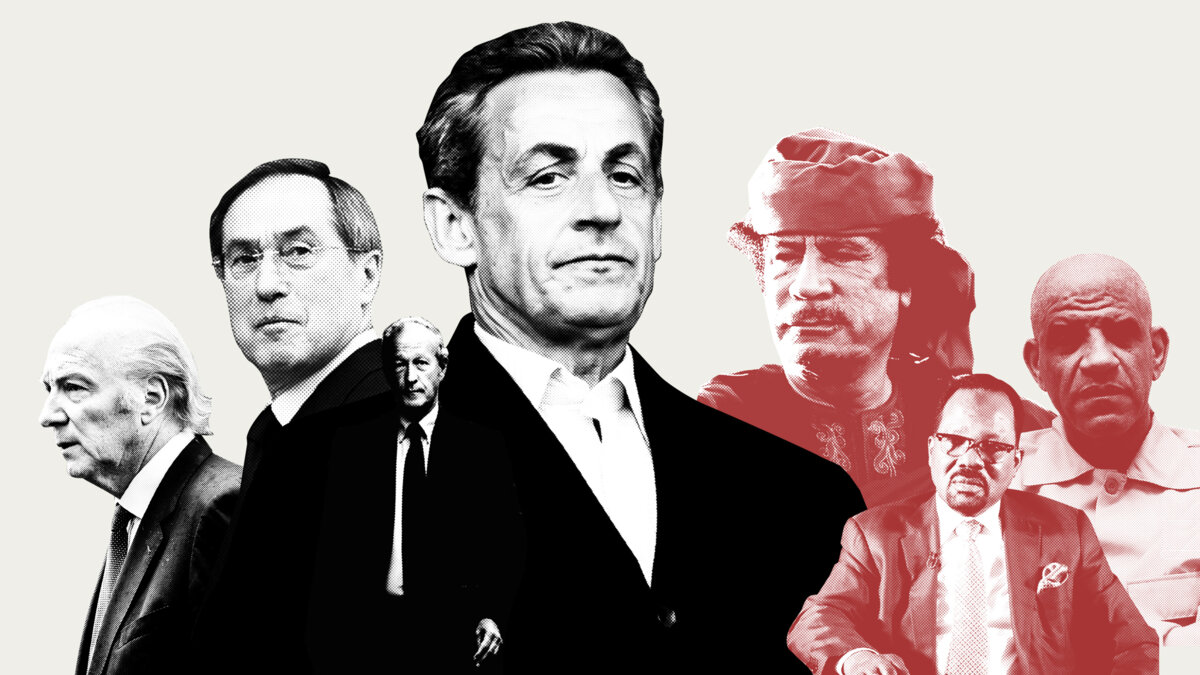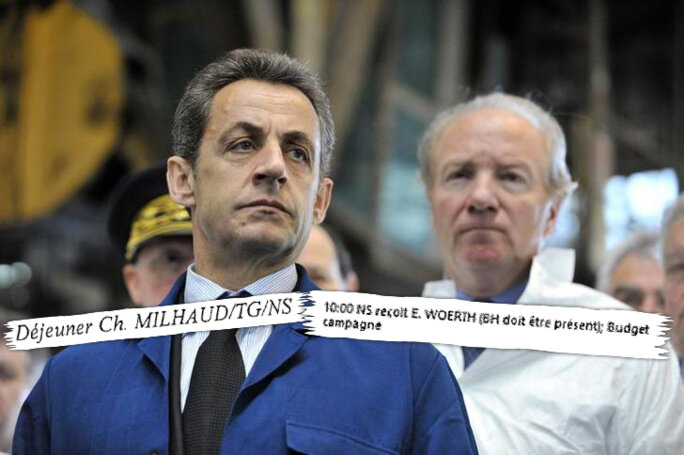Former French president Nicolas Sarkozy was formally placed under investigation for “criminal conspiracy” on Monday October 12th in relation to the long-running investigation into claims that his 2007 presidential election campaign was partly funded by the Libyan regime of Colonel Muammar Gaddafi.
After four days of questioning and around 40 hours of questioning by investigating judges Aude Buresi and Marc Sommerer – which began on October 6th - the ex-head of state (2007 to 2012) was placed under formal investigation for “criminal conspiracy” over the preparation of offences punishable by ten years imprisonment – in this case corruption and the alleged misuse of Libyan public funds.
Under article 450-1 of France's criminal code a “criminal conspiracy consists of any group that comes together or any understanding established with a view to the preparation, indicated by one or more material facts, of one or more crimes or of one or more offences punishable by at least five years imprisonment”.

Enlargement : Illustration 1

In March 2018 Nicolas Sarkozy was put under formal investigation under three different headings - for “illicit funding of an electoral campaign”, “receiving and embezzling public funds” and “passive corruption” - in relation to the same Libyan funding allegations, an affair which was first revealed by Mediapart in 2011.
To be “placed under investigation” in France requires that magistrates have found serious and/or concordant evidence that indicates a person has committed an offence. At the end of their investigation judges can drop the case or send those under investigation for trial, at which point they are formally charged.
It is the first time a former president of France has faced potential prosecution for criminal conspiracy.
Two former ministers under Sarkozy, Claude Guéant and Éric Woerth, who were key figures in the 2007 election campaign as campaign director and treasurer respectively, have also been placed under investigation for the same reason. Éric Woerth is currently the chair of the influential finance committee in France's lower house of Parliament, the National Assembly.
All three deny any wrongdoing, and benefit from the presumption of innocence.
After the news broke on Friday October 16th that he had once again been placed under formal investigation, Nicolas Sarkozy issued a statement in which he attacked the “long list of injustices committed throughout the affair of the supposed 'Libyan funding' of my 2007 election campaign”.
He added: “The French people should know that I am innocent of that which I am accused … Injustice will not win.” (See the full text of the statement under the tab 'More'.)
This latest formal investigation into Nicolas Sarkozy relates to a specific aspect of the Libyan funding case, one which recently came to light. In January 2020 Thierry Gaubert, another figure close to Nicolas Sarkozy and who used to work for him, was placed under investigation under the same heading of “criminal conspiracy”.
At the end of 2019 revelations by Mediapart – subsequently confirmed by the justice system – showed that in February 2006 Thierry Gaubert had received 440,000 euros in an account at the Pictet bank in the Bahamas. He later withdrew half of that money in France as cash.
The 440,000 euros were transferred into his account on February 8th 2006 and came from an offshore company called Rossfield Limited, a shell company which in fact belonged to the Paris-based French-Lebanese arms broker and intermediary Ziad Takieddine. This company was used exclusively to receive funds from the Libyan regime; six million euros in all flowed into it in 2006, with the money later being moved into numerous tax havens.
At the time Ziad Takieddine performed a secret role for Sarkozy's office at the Ministry of the Interior as an emissary to the Libyan regime. He has since acknowledged that he was involved in financial arrangements between the two countries.
This latest investigation into Nicolas Sarkozy seemed inevitable after the judges gave their reasons for why Thierry Gaubert was put under judicial supervision after being placed under investigation in January. In order to avoid “any fraudulent co-operation” the judges forbade Gaubert from “being in the company of the co-authors of or accomplices to the offence: Nicolas Sarkozy, Claude Guéant, Éric Woerth, Brice Hortefeux and Ziad Takieddine”.
The investigators saw Gaubert's transfer of money as especially significant because it occurred just a month after Brice Hortefeux – a close ally of Sarkozy and then the local government minister under him – visited Tripoli and met in secret with the Libyan figure suspected of being the person who ordered the transfer of the money that ended up in the Bahamas account. This was Abdullah Senussi, who at the time was the head of Libya's military secret services and who was actively being sought by the French legal authorities after his conviction in absentia for having organised the 1989 bombing of a French UTA airline DC10 passenger plane over Niger, in which 170 people lost their lives.
The meeting in Libya between Hortefeux and Senussi, which took place on December 21st 2005, was kept hidden from local French officials and – which was unprecedented – took place without the presence of the ambassador or any diplomat, security official or interpretor. The French ambassador to Tripoli at the time, Jean-Luc Sibiude, has since given evidence stating that Hortefeux's trip to Libya as local government minister did not make “much sense”.
The only other person present at the encounter was Ziad Takieddine. Both Takieddine and Senussi have subsequently told the French legal authorities that the meeting involved negotiations over hidden funding, something which Brice Hortefeux strongly denies.
The judges investigating the case have obtained Hortefeux's diaries from the period which also reveal other potentially embarrassing information.
First of all, Thierry Gaubert's name or initials appear in them nearly 30 times between the years 2005 and 2007. In particular Brice Hortefeux dined with him in June 2007 at the Paris home of Ziad Takieddine, who had been the person who had sent Gaubert the Libyan funds a year earlier.
Later Brice Hortefeux was also in contact with the businessman Jacques Lejeune, the legal 'protector' of Gaubert's trust in the Bahamas where the Gaddafi regime money ended up.
Finally, the diaries indicate that Hortefeux did indeed get involved in financial issues at the conservative UMP party (the forerunner to today's Les Républicains), contrary to what he had told detectives in 2018. The entries show that in 2005 and 2006 he took part in a total of four meetings on the issue with treasurer Éric Woerth, two of them attended by Nicolas Sarkozy.

Enlargement : Illustration 2

Claude Guéant had also gone behind the back of the French diplomatic service in 2005 to meet the alleged instigator of the corruption Abdullah Senussi, despite the fact that he was the subject of an arrest warrant issued by France. French judicial documents have described these meetings as “secret and atypical … outside official channels”. In this case Guéant himself has been suspected of personal gain that, investigators believe, stemmed from the same Franco-Libyan “corruption pact”.
All of these events took place while Claude Guéant Brice Hortefeux (who is currently under the status of 'assisted witness' in this investigation - a status which under French law means the person can have a lawyer present and could potentially face prosecution) were working directly for Nicolas Sarkozy.
Since the revelation about the transfer of Libyan money to the Bahamas, Nicolas Sarkozy has sought to distance himself from Thierry Gaubert.
Following Mediapart's December 2019 revelations about the transfer of money, someone close to Sarkozy and another source close to Gaubert insisted to Le Journal du Dimanche newspaper that the two men had no longer had “any contact since 1996”. Brice Hortefeux's diaries and various documents – letters, invitations, gifts – discovered during a search of Thierry Gaubert's home have, however, proven that the latter had been in touch with Nicolas Sarkozy well after that date.
Indeed, the strategy of the judges investigating the affair seems to resemble a pincer movement. On one side it potentially implicates Nicolas Sarkozy via acts occurring after 2005 that were carried out in his name or on his behalf by those close to him; Brice Hortefeux, Claude Guéant and Thierry Gaubert. And on the other it seeks to show how the same Nicolas Sarkozy served the interests of the Libyan dictatorship - against all diplomatic rationale from the point of view of the French state – once he became president in 2007.
“It follows from the proceedings that as of 2005 the principle of secret funding by the Libyan authorities had been established, that some funds, especially in cash, had been delivered to France on several occasions from that time,” stated judges at the Court of Appeal in Paris in their judgement on September 24th, which rejected an attempt by lawyers representing Sarkozy and others named in the investigation to quash the probe.
“In addition,” added the court, “as Éric Woerth [editor's note, 2007 campaign treasurer] has acknowledged, cash funds that were not declared in the campaign accounts were used in particular as additional undeclared wages to pay some people who had contributed to the 2007 electoral campaign and were used to pay expenses that were incurred at the time of the work provided during this campaign”.
In criminal law any corruption pact assumes that there are one or more compensatory acts that take place or are provided in return for any service rendered. According to the Paris court of appeal these have been identified in the Libyan affair. “The quid pro quo in the corruption pact appears in particular through the commitment to intervene to re-examine the situation of Abdullah Senussi, who was wanted in France under an arrest warrant because of his conviction for the attack on the UTA DC-10, or to contribute to Muammar Gaddafi coming out of [editor's note, international] isolation by welcoming him to France and to serve his personal ambitions,” continued the judgement.
For several years Mediapart has been documenting all the work that was carried out, between 2005 and 2009, by Sarkozy's team – and against all logic in terms of the interests of the French state – to remove the arrest warrant against Abdullah Senussi, one of the main architects of the alleged corruption (see here and here). “It does indeed involve the acceptance of funds in return for favourable decisions for the actual authors of the active corruption,” the court of appeal said.
Nicolas Sarkozy is due to stand trial this November in another corruption affair, known as the 'Bismuth' affair, involving claims claims he tried to induce a senior magistrate to hand over confidential legal information. In March 2021 he is also due to stand trial in the so-called Bygmalion scandal over the funding of his 2012 election campaign.
-------------------------
If you have information of public interest you would like to pass on to Mediapart for investigation you can contact us at this email address: enquete@mediapart.fr. If you wish to send us documents for our scrutiny via our highly secure platform please go to https://www.frenchleaks.fr/ which is presented in both English and French.
-------------------------
The French version of this article can be found here.
English version by Michael Streeter



